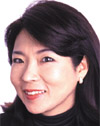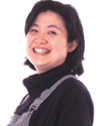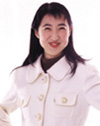Japan's Female Netpreneurs
Back to Contents of Issue: April 2000
|
|
|||||||||||||||||||||||||||||||||||||||||||||||||||||||||||||||||||||||||||||||||||||||||||||||||||||||||||||||||||||||||||||||||||||||||||||||||||||||||||||||||||||||||||||||||||||||||||||||||||||
|
by Gail Nakada |
|||||||||||||||||||||||||||||||||||||||||||||||||||||||||||||||||||||||||||||||||||||||||||||||||||||||||||||||||||||||||||||||||||||||||||||||||||||||||||||||||||||||||||||||||||||||||||||||||||||
|
Somehow it's hard to imagine an organization like the US-based National Association of Gender Diversity Training -- which provides "training, resources, and tools on gender issues in the workplace" -- making much headway in Japan. Consider this: Diet upper house member Seiko Hashimoto is due to give birth this month. There hasn't been a woman with a baby in the Diet for 50 years. "There are no provisions for maternity leave," a spokesman told the papers after a vain search for precedents.
"The Japanese economy," says Janet Ang, director of Asia Pacific sales operations for IBM, in polite understatement, "is not leveraging sufficiently on their resource of educated women." Women make up 50.4 percent of the workforce, but, according to Teikoku Data Bank, only about 60,000 are serving as executives. The Labor Ministry puts the percentage of women in middle management of companies with 30 or more employees at just 2.4 percent. "The drop-off curve of women leaving their jobs and not returning to work," Ang goes on to say, "is very high." Perpetuating this brain drain is a lack of access to childcare and little interest from companies in addressing the issues (imports like flex-time, in-house child care, and job sharing have yet to clear customs). Of course, concussions from America's glass ceilings could fill any number of emergency rooms. But in the US, organizations like Catalyst, the National Foundation for Women Business Owners, and the National Association for Female Executives bring an organized advocacy voice to women in business. American women also understand the dynamics of networking and mentoring. In January, Silicon Valley hosted Springboard 2000, the first of a series of VC forums around the US and abroad designed to increase investment channels for women. The forum targeted women looking for between $1.5 and $15 million in funding for high-tech ventures. In Japan, though, equal opportunity laws weren't passed until 1986. Women are still in their first generation of taking on the status quo, and it's an uphill climb with negligible support. Women's magazines seem more intent on encouraging readers to work so that they can afford designer bags, not so that they can achieve satisfying careers. It's not all sturm und drang, of course. The Internet has become a venue for Japanese women to break away from their "ten clicks behind" status and explore Web-based business models. Armed with a rolodex and determination, some women are managing to hack their way through the barriers and step into the bright light of the executive suite. It can happen. It does happen. Not very often, but it happens. Following, we take a look at eight women for whom it has happened, to one extent or another. Keiko Iida became president of Photonet Japan at 33. Her push to develop photo applications for the i-mode phone expanded the company's product base and helped triple its working capital. Fujiyo Ishiguro left Japan for Silicon Valley to create Alphametric, a cross-border strategic high-tech consulting company for the US and Japanese markets, and then she joined forces with Sonny Koike to become Net Year Group's president and COO. Kumi Sato is president of womenjapan.com. Her Internet portal is working to empower and educate women about their options in life, health, love, and the pursuit of a damn good job. Mae Towada of eSampo.com has a similar vision for her company's site. Emerging entrepreneurs can look to Hiromi Saito, president of the SOHO Incubation Center, for office space and fast-track introductions to partners and financing. Young women in Japan and around the world can check out all things cool through Sayuri Kosugi's Coolgirlsjapan.com. Pallas Global Enterprises' Yumi Hirahara provides marketing and language services to companies targeting online global growth, and Kanae Tsutsumi hopes Career-Mam will provide an Internet platform for those who feel they have no voice. Some of these women are already practicing the mantra of Net success ("IPOooooo, IPOoooo, IPOoooo"). For others, just getting from the status of Yugengaisha (limited company) to Kabushiki Gaisha (joint stock company, or K.K.) is a hurdle left to clear. But that's not the point. What all these women represent is the potential of Japan's female workforce. It's still too soon to know what the Internet's full impact on female empowerment will be, but the women below have all used it to help level the playing field in business, both for themselves and for others to come.
"This" is a brochure overflowing with professional pictures of cats and kittens. "For just 200 yen a month you can have a kitty-a-day service on your phone." Guys, she points out, can log on to more pheromone-enhanced packages with gal-a-day headshots for the same low price. Showing off the different applications, Iida says, "Japanese are very familiar with games and cell phones, much more than PCs. This kind of push-button technology we're selling isn't frightening -- it's fun."
Iida joined Photonet after a recruiting firm offered her a position in the small startup, which was seriously short of skilled managers. Actually, with only four other employees, it was seriously short of everything. No matter. "I grew up very independent," Iida says. "Both my parents had careers, and I wanted interesting work. Money has never been my object. I like to be intrigued by what I'm doing." Her first job, with an oil refining company, resulted in rapid promotion after a surprise merger. "I was picked for a special project that spanned four years. We reviewed both companies' land and assets and came up with feasibility studies on how to make the best uses from them." Once the project wound down, she was offered a good position in another division, but, "I just couldn't go back to routine work after that." Leaving the oil business, she joined a Japanese trading company and spent the next five years traveling through South America, Southeast Asia, and Europe, negotiating deals for industrial machinery and equipment. "It was like a contest, competing against other suppliers for the best deal." Eventually, exhausted by the constant travel, Iida decided to take a year off to visit friends in America and relax. It was during this time she was offered the startup job. In Photonet's core business, customers drop off film (analog or digital) at the developers, where pictures are scanned directly into the Photonet server. Users can then access the photos online with a registration number, paying a monthly fee to maintain their own picture site. The service removes the need for special software and technical expertise. Users can manipulate, print out, and email pictures, and others can easily log on to the site with the proper ID code. "In the states they've concentrated more on analog scanning," says Iida. "Here in Japan, though, digital is the preferred mode. I felt we needed to modify the American model for this market and broaden penetration." From the start, she focused on digital camera tie-ups, cell phones, and convenience stores, with an eye on the soon-to-launch Net terminals. She also decided, "No settai." Settai is the Japanese custom of after-hours wining and dining of clients that pads so many expense accounts. "The only people interested in settai are older guys," she says. "It's an unnecessary expense and, honestly, in the Internet business schedules are too tight. We are working with people mostly in their 30s or younger, just as busy as us. Who has time to eat?"
Ishiguro was born in Nagoya, a city famous for its conservative, no-nonsense approach to business. Her father ran a small manufacturing company next door to the family home. "When I was very young I was a little shy," she says. "But the love of my parents and the responsibility they gave me helped me to change." She credits her parents for encouraging her independence, though at some cost: "Whenever I asked advice from my mother and father, they always said, 'It's your life, it's up to you to decide' -- always!" Laughing, she adds, "Looking back, I can't say if they were giving me advice or it was just their personalities!"
Between the frustrating search for a job after graduation and taking on her present title, Ishiguro worked at Brother Industries. There she became the first woman sent abroad on sales and marketing missions for the company, and the first to hold the equivalent of a product manager's position (though not the title), handling the OEM division for the US market, and later the European printer division too. After leaving Brother and moving to Tokyo, she turned down several job offers with well-established companies, choosing instead to become marketing manager for a European crystal manufacturer that was trying to break into Japan's consumer market. At only 30, she would be ten years younger than most Japanese managers, which of course sealed the deal for her. "It looked like the bigger challenge." Though she successfully built up a client base for the company, Ishiguro found herself growing increasingly disillusioned with the working environment in Japan. "The infrastructure to support working mothers in day care and in schools just isn't there. After the birth of my son, I discovered it's almost impossible for a woman with a baby, working as a manager, to live in Japan. I decided to go to America." She applied to ten MBA programs and was accepted at nine schools. After graduation from Stanford, she once again turned down the chance to work for a large company. "There was this chance to run a startup for Paltek, establishing their US office. I learned they were involved in semiconductors, which, honestly, I wasn't very interested in." Instead, she pitched them the idea of creating a cross-border strategic high-tech consulting company for the US and Japanese markets. "Really, I wanted to run the office by myself, decide the dynamics of the business." The company agreed, and she set up Alphametric as a subsidiary of Paltek. Yahoo and Netscape were among the first clients, but Ishiguro knew she needed to go after well-paying Japanese corporations. Traveling back and forth to Japan, she soon added Sony, Panasonic, and NTT to the list. Despite Alphametric's success, it wasn't enough for Ishiguro. "Alphametric wasn't really a startup," she says. "Paltek owned it. Though I built it, I couldn't really take an equity position of more than 49 percent." Dentsu was a client, and she had run into its Sonny Koike many times. They began talking about working together. After Koike's management buyout of Net Year Group in October '98, Ishiguro came over to Net Year as president and COO, bringing her client list with her. "I never really encountered problems dealing with top executives of Japanese corporations," she says. "Perhaps because I was a Japanese woman working out of Silicon Valley, I got a lot of respect from them. When you get down to it, businesses are looking for value -- it's got nothing to do with gender."
The site addresses issues such as health, work, finding a job or quitting one, personal relations, and more. It's written by women for women. The closest comparison is Women.com in the US. "Part of our role is to mentor Japanese women. They can come to us, find the answers and, we hope, apply them to their lives," Sato says. "Our users have consistently shown us they want work skills. We've focused a lot of content in that area. 'Here's how to get computer skills, this is what's necessary to be a translator,' et cetera. If we don't offer them solutions, people are not going to come back. Entertainment is important, and we incorporate it into the site, but fashion tips can only take you so far in life." Sato has been careful to grow the business with the market. "One of the positive things of doing this in Japan is we already have a lot of good -- and bad -- models from the US. You have a site that's making $3 million and you're spending $20 million in marketing and advertising? Do the math."
Cosmo had been a family business, but with the death of her father, management passed into other hands. Eventually, Sato's mother grew concerned about Cosmo's direction. "My mother called and said, 'You're a big-time consultant, do a consulting on the company.' Afterwards she said, 'You should take it over.'" "When I came back to Tokyo from New York, I was 27. I bought the company from the shareholders. Cosmo had cash-flow problems and my first job as the new boss was to go borrow money from the bank. I went to our company's bank and they said, 'You're 27. If I loaned you the money I would lose my job.' So I took our account and went elsewhere. Three years later the banker came crawling over trying to get our account back!" Under her leadership, the company grew steadily. "Business was good. We were offering a unique service to international clients, because we understood their perspective as well as the Japanese. But I noticed, within Cosmo, when I looked over my shoulder, it seemed like no one was buying my vision. I learned to refine my management skills and empower people." She has put those skills to good use in her present position heading up Women-
japan.com. "What we're doing in building an Internet business is different because of the speed this model demands. It's 'Hurry up, deal a day, deal a day, spend money, spend more!' The speed is different, but the issues of running a company are all there, and there's no way you're going to get around it. There are obviously going to be a lot of people issues. Nobody talks about that. Take a roomful of creative independent workers who are like prima donnas, put them in a room, and don't let them sleep for a long time. Tell me what the dynamics are of that! You have to build a company culture that's free thinking and yet, at the same time, with the understanding there are parameters we have to work in. You need leaders, not just doers. And the leaders have to have experience."
Towada, managing director of eSampo.com, is sitting at the big solid wood table she and her staff gather round for conferences and meetings. Coffee in hand, she looks remarkably rested for someone in the second round of financing. Desks and cables snake around the large room ... hardwood floors, tastefully furnished ... it's Martha Stewart meets the Internet age! Much like eSampo.com itself.
"Growing up in Japan and attending international schools, I was pretty ambitious. Thought I'd like to work in a large company and all that. It didn't really dawn on me till I went to the States -- where ambitions are so much bigger -- that you can start a company at any age. I went to Northwestern University in Chicago for my MBA. It was 1996, right when the Internet was exploding in the US. There's a lot of group-work, and Chicago is so cold in the winter nobody wants to go out. We coordinated everything on the Net. We didn't even have to get together in one room until the very end." All the Web-generated excitement in the United States started her thinking about putting together a Net startup of her own. Plans had to be put on hold temporarily while working for Disney in Hong Kong, but her husband's transfer to Tokyo forced Towada to make a choice. "I decided that if I was going to do a startup, it had better be now. Once you get a job in an established company, it's too easy to get complacent." Towada says she and her partners approached it from a user standpoint. "None of us are technical experts. We focused on what was missing with the existing media, what gap was there that the Internet could fill. There are not a lot of support groups for women in Japan. Many questions are hard for women to ask face to face here. Done anonymously, though, you can start them on the road to answers. The Internet seemed like a natural venue." eSampo's first angel investors were from the US. "They have more experience in Net startups. They helped us build up a business plan and so forth. There are a lot of women-focused sites that have succeeded splendidly -- it's easy for them to understand what we're talking about. The US has very sophisticated management systems. They advise us on when to clear milestones and set up reasonable targets. Larger Japanese companies are definitely taking the Internet more seriously. They understand the potential of investing in a women's site. A year ago that would have been very difficult to sell." She credits her grandmother with helping her keep eSampo's goals in sight. "My grandmother started the first English school in Taiwan. She had a lot of success there, and she had a big impact on me as to how women should live. She always said, 'You should be independent, decide what you want to do and how you're going to do it, speak more than one language, take your education seriously, and understand where your strengths are.' Given when she lived, she had it a lot more difficult than me. Yet she made it. I'm gambling we can make it too."
These days the closest Saito usually gets to the beach is the view of Yokohama Bay from her wide-screen office windows. And her surfing is more the Net variety. Her company, SOHO Inc., is working on a project that will give small-scale network businesses higher security and open-system servers. The funding is from MITI, and that also helps finance her main venture: the SOHO Incubation Center in Yokohama. The center provides fast-wire, low-cost office space to fledgling entrepreneurs, and vital help in drafting business plans, searching for partners, and making introductions to public or private financing. It's the first of a proposed chain of incubation centers around the country. Then there's Saito's award-winning civil architectural firm, Space Creation, which produces next-generation city planning and highway designs.
"People gave me a hard time when I was young," Saito says. "Not my parents -- my father was adamant about pursuing your dreams, and followed his own advice, giving up his business as an architect for antiques. Others, though, would say, 'Why are you different?'" Saito started working after school at 14, creating crafty business cards for designers and artists. "I was such a hippy," she laughs. "It was all psychedelic." Soon she was designing interiors at trendy shops, and ended up managing and buying -- still in her teens -- for a US-influenced surf boutique in Harajuku. Saito had two advantages going for her: an outgoing personality that lets her connect to people effortlessly, and a real knack for making money. Following graduation she concentrated on business studies, and served as coordinator for The Forum, an exclusive business/social club in Akasaka. There she was recruited to represent a big company called Vendome of Tokyo at its jewelry sale and exhibition for Bloomingdale's Japan Fair in '85. "On the day of the fair, the trucks were supposed to arrive at 6 a.m. to transport the displays and stock from my office to Bloomies. Hours passed, no trucks. Finally they pull up a half hour before the store is supposed to open. Vendome had a huge display window right on Lexington Ave. The store opens, and there I am in the window still putting up the display. But you know, I sold out my entire stock that day -- people were buying them off me while I worked!" Saito enrolled in the New York State University Fashion Institute of Technology in '85. Living in New York proved to be a pivotal experience. "I looked around and everyone was doing something different," she says. "Just taking it for granted! I was like, 'Who, what, when, where?!' I didn't know how to cope at first. At the Institute I learned being different was not only all right, it was to be sought after." American friends in the venture business advised her to go into VC or fundraising. Eventually she found work back in Japan as a researcher for the Long Term Credit Bank. It was the grounding she needed to begin her own startups. SOHO's business scope underlines Saito's need to support other independent thinkers. This year she begins lecturing at the University of Electronic Communication on venture support education. "Japanese believe in things they can see," she says. "It's not really as spiritual as you might think. One of the reasons for the bubble economy was people became anesthetized to excess. Still, you cannot underestimate trust in this country as a factor in success -- trust between people, companies, you, and your customers or clients. The media and TV are full of discussions on 'New Business Methods,' with big capital letters. I feel very strongly, though, that you can't ignore either the basics of building a business or the importance of building relationships. It's like DNA -- every link is vital. We are a relationship-driven culture. A business built only on a 'virtual' foundation doesn't have much of a future here."
Coolgirlsjapan.com clicks on several levels. It's full of content (in both Japanese and English) on fashion, cosmetics, design, modeling, Tokyo, New York, (cute) girls, (cute) boys, clubs, partying, more clubs and partying. Its bulletin boards and chat rooms are beginning to resemble Excite classifieds. This one from Korea gets right to the point: "I'm looking for girls. I'm nice guy."
"When I first heard the word "Internet" I was really interested, and thought, 'What a great opportunity to make friends in other countries. I'll make a homepage!' Of course," she starts to laugh, "first I had to buy a computer!" Now she's laughing harder: "Then I had to learn how to use it! I didn't even know how to turn the thing on!" But Kosugi is a determined person. She went to the bookstore, stocked up on PC and HTML how-tos, and just did it. Almost immediately the Coolgirls Japan homepage started receiving email from users eager for info about young Japan. New York graphic designer Rosemarie Jacobson contacted Kosugi and asked if she could come on board as a designer. Jacobson is a professional graphic artist who has worked for ABC and NBC News. Soon Vanessa Jordan, who writes on beauty issues for Vogue and Glamour, asked if she could write a regular column. It became obvious that Coolgirls was turning into a real business. Kosugi quit her job and set up a company of her own. Advertisers began contacting her, she hired staff, and the buzz was on. In October 1999, an American VC company surfing the Web came upon the Coolgirls Japan site. It liked what it saw and contacted her about investing. Japanese VCs have approached Coolgirls Japan, too. Kosugi is considering their offers, but she is also exploring other investment options. "They're talking IPO," she says. Companies as diverse as BMW and Shiseido have done everything but jump up and down waving their arms in the air to get her attention. "They contact us a lot," she says, the glazed look back. It's been a long day, and fatigue is setting in. She's just been through several meetings, including one with consultants working with her on a viable business plan. "AOL Japan's women's section wants us to work with them on content, and Softbank is talking about a new women's site which would also be a channel for Coolgirls Japan. Right now we've come to the point where I am looking for a COO." Not too shabby for someone who skipped college to join a cosmetic company, dreaming of being a freelance make-up artist. Getting up to go, Kosugi is all business in her black and white suit. "Japanese people may think being independent sounds romantic, but it's a hard path." As she walks away you can see she hasn't entirely forgotten her roots -- she's wearing three-inch platforms.
Hirahara left Japan at age seven on the first of her father's many overseas postings. Sandwiched between two cultures, she eventually decided to return "home." "I was terrified, honestly, but this is my country," she says. "I'm Japanese, and I felt I should try and make my career here.
"My business plan was large-scale," she continues, "and when I started out I didn't have the resources to make it happen. My mentors suggested I narrow my focus, so I decided to take a little time to carefully work things through." In the interim, she and a group of women put together an association called Sigma Jay. "We all met at a course for women entrepreneurs. We felt that putting together an organization for people like us would be a good rehearsal for setting up a company. Sigma Jay stands for the three things you need in business: joho (information), jinmyaku (networking), and jisseki (experience). More than half the members have started companies, so now we're a group of real entrepreneurs." The organization is open to men, though the core members are women. "If the men are comfortable with that, we welcome them. Business is not a single-gender activity." Pallas Global Enterprise, Hirahara's company, began with a mission to help small ventures go global. "We specialize in marketing consulting, but we can also help clients with a wide range of bilingual projects, from creating a global website to business proposals, sales tools, press releases, and presentations to investors in English, Japanese, or both languages. Many companies -- large and small -- are looking to expand globally, and the Internet has really accelerated that." Through the Sigma Jay network, Hirahara feels she's gained
access to know-how from people with different professional
backgrounds. "Since we were all starting out with little or
nothing, we became each others' resources, and now we've also
become each others' clients and vendors. Outsourcing is what
it's all about nowadays. We don't have to be in the same city
or even the same country."
Tsutsumi's site, Career-Mam, is working to establish an online community where women can exchange opinions and advice. There are certainly more exciting and sophisticated sites to go to: Career-Mam is a soft and puffy collection of helpful hints and advice on living and working for women, especially those with children. But the real action is in the chat rooms and on the bulletin boards.
The exclusive private girls school Tsutsumi attended in Kobe is famous for turning out well-educated wives for top-class businessmen. "The idea of femininity in Japan seems to be the ability not to say anything. Make no comment, keep quiet. I decided in high school that that was not my idea of being a woman." After graduating from Waseda University, she decided to pursue a career in communications. She was one of the few picked to enter a famous broadcasting school. She became an announcer, DJ, and TV personality. "It was tough. I had to live from audition to audition. In the beginning I had to take part-time jobs." Tsutsumi understands the needs of the women who come to her site. "Highly skilled women, women with lots of drive and ambition, they have great places to go to like Womenjapan.com or eSampo. The women who come to us are used to being identified as somebody's wife or someone's mother. They are looking for a place they can begin to nurture their own identity." Working with their core membership of 10,000, Tsutsumi and her team generate revenue by conducting market research for different clients. Two thousand Career-Mam members also participate in telemarketing projects for the company. The importance of Tsutsumi's work is that she is using the Internet to try to reach women who feel they have no voice. She calls it a "mind culture center." Maybe she will succeed in climbing out of the red, securing more funding, and making it to K.K. status. Maybe she won't. Either way, the coverage she has gotten in the Japanese press and word of mouth from users has a trickle-down effect that may inspire others. "I think so many Japanese women and men, too, are living on automatic. They're not making the most of their lives. Your life is also your career, not just the other way around." |
|||||||||||||||||||||||||||||||||||||||||||||||||||||||||||||||||||||||||||||||||||||||||||||||||||||||||||||||||||||||||||||||||||||||||||||||||||||||||||||||||||||||||||||||||||||||||||||||||||||
Note: The function "email this page" is currently not supported for this page.













